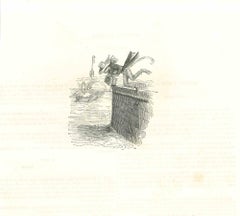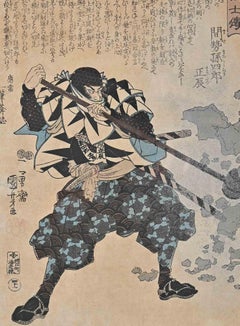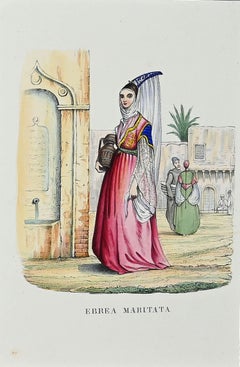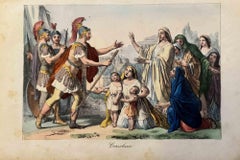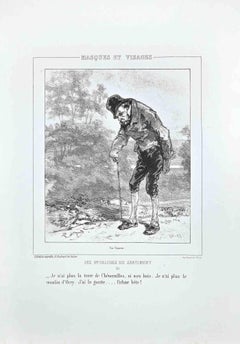Mid-19th Century Figurative Prints
to
2,857
2,923
455
21
13
3
Overall Width
to
Overall Height
to
2,877
55
37
21
6
2
1
1
100
95
87
82
34
3,544
7,581
25,983
6,793
293
652
1,394
1,247
1,339
2,292
3,778
5,346
2,765
1,263
3,039
1,796
1,599
20
2,467
1,212
969
908
649
477
351
335
236
187
178
175
152
140
138
120
117
113
108
104
2,531
642
351
156
99
69
2,755
1,980
177
Period: Mid-19th Century
Mr. Monkey Drowning Himself - Original Lithograph by J.J Grandville - 1852
Located in Roma, IT
Mr. Monkey Drowning Himself is an original lithograph on ivory-colored paper realized by J.J. Grandville from Scènes de la vie privée et publique des animaux, 1852. Published by Mane...
Category
Modern Mid-19th Century Figurative Prints
Materials
Paper, Lithograph
Mase Magoshiro Masat - Woodblock Print after Utagawa Kuniyoshi - 1847
Located in Roma, IT
Mase Magoshiro Masatatsu ia a woodcut print realized by Utagawa Kuniyoshi n 1847 ca.
Includes wooden and leather frame.
Good conditions: some stain...
Category
Modern Mid-19th Century Figurative Prints
Materials
Woodcut
$395 Sale Price
25% Off
Ebrea Maritata (Married Jewish) - Lithograph - 1849
Located in Roma, IT
Ebrea maritata (Married Jewish) is an original artwork realized by an Unknown artist in 1849s.
Beautiful lithograph hand-watercolored on paper.
Good conditions. Titled on the botto...
Category
Modern Mid-19th Century Figurative Prints
Materials
Lithograph
$219 Sale Price
25% Off
Uses and Customs - Women and Soldiers - Lithograph - 1862
Located in Roma, IT
Uses and Customs - Women and Soldiers is a lithograph on paper realized in 1862.
The artwork belongs to the Suite Uses and customs of all the peoples of the universe: " History of t...
Category
Modern Mid-19th Century Figurative Prints
Materials
Lithograph
$175 Sale Price
25% Off
Les Invalides du Sentiment - Original Lithograph by Paul Gavarni - 1850s
By Paul Gavarni
Located in Roma, IT
Les Invalides du Sentiment is a lithograph on ivory-colored paper, realized by the French draftsman Paul Gavarni (alias Guillaume Sulpice Chevalier Gavarni, 1804-1866) in the mid-19t...
Category
Modern Mid-19th Century Figurative Prints
Materials
Lithograph
Vampire Spectre - Original Lithograph by Paul Gervais - 1854
By Paul Gervais
Located in Roma, IT
Vampire Spectre is an original lithograph on ivory-colored paper, realized by Paul Gervais (1816-1879). The artwork is from The Series of "Les Trois Règnes de la Nature", and was pub...
Category
Modern Mid-19th Century Figurative Prints
Materials
Lithograph, Paper
$175 Sale Price
25% Off
The Sea of Tiberias. David Roberts Holy Land lithograph, 1844.
Located in Melbourne, Victoria
'The Sea of Tiberias', tinted lithograph by Louis Haghe (1806-1885) after David Roberts RA.
David Roberts (1796-1864) traveled throughout Egypt and the Holy Land in the late 1830s p...
Category
Victorian Mid-19th Century Figurative Prints
Materials
Lithograph
Uses and Customs - Como Cathedral - Lithograph - 1862
Located in Roma, IT
Uses and Customs - Como Cathedral is a lithograph on paper realized in 1862.
The artwork belongs to the Suite Uses and customs of all the peoples of the universe: " History of the g...
Category
Modern Mid-19th Century Figurative Prints
Materials
Lithograph
$131 Sale Price
25% Off
Uses and Customs - Republic of Cisalpina - Lithograph - 1862
Located in Roma, IT
Uses and Customs - Republic of Cisalpina is a lithograph on paper realized in 1862.
The artwork belongs to the Suite Uses and customs of all the peoples of the universe: " History o...
Category
Modern Mid-19th Century Figurative Prints
Materials
Lithograph
$175 Sale Price
25% Off
Kabuki Scene- Woodcut Print by Utagawa Kunisada - 1850s
Located in Roma, IT
Kabuki Scene is an original artwork realized in the mid 19th century by the Japanese master Utagawa Kunisada (1786-1865).
Color woodcut print. The artwork is a rare triptych (each ...
Category
Modern Mid-19th Century Figurative Prints
Materials
Woodcut
$1,670 Sale Price
25% Off
Uses and Customs - Ischia - Lithograph - 1862
Located in Roma, IT
Uses and Customs - Ischia is a lithograph on paper realized in 1862.
The artwork belongs to the Suite Uses and customs of all the peoples of the universe: " History of the governmen...
Category
Modern Mid-19th Century Figurative Prints
Materials
Lithograph
$140 Sale Price
25% Off
Don Quichote - Etching, Aquatint and Drypoint by F. Braquemond - 1860
Located in Roma, IT
Don Quichote is an original etching, aquatint and drypoint, frontispiece for La Gazette des Beaux Arts, realized by Frenc artist Félix Henri Bracquemond...
Category
Mid-19th Century Figurative Prints
Materials
Etching, Drypoint, Aquatint
Persians - Costumes - Lithograph - 1844
Located in Roma, IT
Persians - Costumes is a Hand-colored lithograph on paper realized in 1862.
The artwork belongs to the Suite Uses and customs of all the peoples of the universe: " History of the go...
Category
Modern Mid-19th Century Figurative Prints
Materials
Lithograph
$175 Sale Price
25% Off
Uses and Customs - Horse Mounting Method - Lithograph - 1862
Located in Roma, IT
Uses and Customs - Horse Mounting Method is a lithograph on paper realized in 1862.
The artwork belongs to the Suite Uses and customs of all the peoples o...
Category
Modern Mid-19th Century Figurative Prints
Materials
Lithograph
$158 Sale Price
25% Off
Owls - Etching by Johann Friedrich Naumann - 1840
Located in Roma, IT
Owls is an Etching hand colored realized by Gotthilf Heinrich von Schubert - Johann Friedrich Naumann, Illustration from Natural history of birds in pictures, published by Stuttgart ...
Category
Modern Mid-19th Century Figurative Prints
Materials
Etching
$263 Sale Price
25% Off
Military - Original Lithograph by Auguste Raffet - 1857
Located in Roma, IT
Military is an Original Lithograph realized by Auguste Raffet in 1857.
Hand-Signed and dated by the artist on the lower left corner.
Good conditions on a cream colored cardboard.
...
Category
Modern Mid-19th Century Figurative Prints
Materials
Lithograph
$290 Sale Price
25% Off
Souvenir d'Italie - Etching by Camille Corot - 1860s
Located in Roma, IT
Souvenir d'Italie is a black and White etching realized by Camille Corot in the 1860s.
Titled in the lower
Image Size: 32x23
Very good impression.
Realized for the "Société des ...
Category
Modern Mid-19th Century Figurative Prints
Materials
Etching
Sheffield - Original Lithograph - Mid-19th Century
Located in Roma, IT
Sheffield is an original modern artwork realized in the Mid-19th Century.
Original B/W Lithograph on Ivory Paper.
Inscripted on the lower central margin in Capital Letters: Sheffi...
Category
Modern Mid-19th Century Figurative Prints
Materials
Lithograph
$158 Sale Price
25% Off
Customs - Persian Palanquins - Lithograph - 1862
Located in Roma, IT
Customs - Persian Palanquins is a lithograph on paper realized in 1862.
Titled on the lower.
The artwork belongs to the Suite Uses and customs of all the peoples of the universe: "...
Category
Modern Mid-19th Century Figurative Prints
Materials
Lithograph
$131 Sale Price
25% Off
Uses and Customs - Dresses in Athens - Lithograph - 1862
Located in Roma, IT
Uses and Customs - Dresses in Athens is a lithograph on paper realized in 1862.
The artwork belongs to the Suite Uses and customs of all the peoples of the universe: " History of th...
Category
Modern Mid-19th Century Figurative Prints
Materials
Lithograph
$158 Sale Price
25% Off
Uses and Customs - Map of Churches - Lithograph - 1862
Located in Roma, IT
Uses and Customs - Map of Churches is a lithograph on paper realized in 1862.
The artwork belongs to the Suite Uses and customs of all the peoples of the universe: " History of the ...
Category
Modern Mid-19th Century Figurative Prints
Materials
Lithograph
$158 Sale Price
25% Off
Diseases of the Uterus - Lithograph By Ottavio Muzzi - 1843
Located in Roma, IT
Diseases of the Uterus is a lithograph hand colored by Ottavio Muzzi for the edition of Antoine Chazal, Human Anatomy, Printers Batelli and Ridolfi, 1843.
The work belongs to the At...
Category
Modern Mid-19th Century Figurative Prints
Materials
Lithograph
$175 Sale Price
25% Off
Two Kabuki Actors Japanese Woodblock Print
Located in Houston, TX
Two kabuki actors posing a samurai's. The print is printed on rice paper and is not framed. It is stamped by the artist with details about the actors in ...
Category
Edo Mid-19th Century Figurative Prints
Materials
Woodcut
Devil's Bridge - Lithograph - 1862
Located in Roma, IT
Devil's Bridge is a hand colored lithograph realized in 1864.
Good condition.
The artwork belongs to ththe Suite Uses and customs of all the peoples of the universe, or History of ...
Category
Modern Mid-19th Century Figurative Prints
Materials
Lithograph
$193 Sale Price
25% Off
Speaking of Ladies Roses - Original Lithograph by J.J. Grandville - 1852
Located in Roma, IT
Speaking of Ladies Roses is an original lithograph on ivory-colored paper realized by J.J. Grandville from Scènes de la vie privée et publique des animaux, 1852. Published by Manesq ...
Category
Old Masters Mid-19th Century Figurative Prints
Materials
Lithograph
Chbysochlore - Original Lithograph by Paul Gervais - 1854
By Paul Gervais
Located in Roma, IT
Chbysochlore is an original lithograph on ivory-colored paper, realized by Paul Gervais (1816-1879). The artwork is from The Series of "Les Trois Règnes de la Nature", and was publis...
Category
Modern Mid-19th Century Figurative Prints
Materials
Lithograph
$202 Sale Price
25% Off
Persian Coins - Lithograph - 1862
Located in Roma, IT
Customs -Persian Coinsin China is a lithograph on paper realized in 1862.
Titled on the lower.
The artwork belongs to the Suite Uses and customs of all the peoples of the universe:...
Category
Modern Mid-19th Century Figurative Prints
Materials
Lithograph
$158 Sale Price
25% Off
Testicular Diseases - Lithograph By Ottavio Muzzi - 1843
Located in Roma, IT
Testicular Diseases is a lithograph hand colored by Ottavio Muzzi for the edition of Antoine Chazal, Human Anatomy, Printers Batelli and Ridolfi, 1843.
...
Category
Modern Mid-19th Century Figurative Prints
Materials
Lithograph
$175 Sale Price
25% Off
Mr. Bunny Eating A Big Carrot - Lithograph by J.J Grandville - 1852
Located in Roma, IT
Mr. Bunny Eating A Big Carrot is an original lithograph on ivory-colored paper realized by J.J. Grandville from Scènes de la vie privée et publique des animaux, 1852. Published by Ma...
Category
Modern Mid-19th Century Figurative Prints
Materials
Paper, Lithograph
Sparrow - Etching by Johann Friedrich Naumann - 1840
Located in Roma, IT
Sparrow is an Etching hand colored realized by Gotthilf Heinrich von Schubert - Johann Friedrich Naumann, Illustration from Natural history of...
Category
Modern Mid-19th Century Figurative Prints
Materials
Etching
$219 Sale Price
25% Off
Intestinal Diseases - Lithograph By Ottavio Muzzi - 1843
Located in Roma, IT
Intestinal Diseases is a lithograph hand colored by Ottavio Muzzi for the edition of Antoine Chazal, Human Anatomy, Printers Batelli and Ridolfi, 1843.
The work belongs to the Atl...
Category
Modern Mid-19th Century Figurative Prints
Materials
Lithograph
$175 Sale Price
25% Off
Shunga - Woodcut attr. Keisai Eisen - Mid-19th Century
By Keisai Eisen
Located in Roma, IT
Woodcut shunga print attributed to Keisai Eisen and realized in the early 19th century.
Good condition except for some signs of time.
Category
Modern Mid-19th Century Figurative Prints
Materials
Woodcut
Wild Canary - Etching by Johann Friedrich Naumann - 1840
Located in Roma, IT
Wild Canary is an Etching hand colored realized by Gotthilf Heinrich von Schubert - Johann Friedrich Naumann, Illustration from Natural history of birds in pictures, published by Stu...
Category
Modern Mid-19th Century Figurative Prints
Materials
Etching
Tapir Pinchaque - Original Lithograph by Paul Gervais - 1854
By Paul Gervais
Located in Roma, IT
Tapir Pinchaque is an original lithograph on ivory-colored paper, realized by Paul Gervais (1816-1879). The artwork is from The Series of "Les Trois Règnes de la Nature", and was pub...
Category
Modern Mid-19th Century Figurative Prints
Materials
Lithograph
$202 Sale Price
25% Off
Le Bon Coté - Original Lithograph by C. Pruche - 1840 ca.
Located in Roma, IT
Colored lithograph on ivory colored paper.
Beautiful satiric illustration by the French draftsman and caricaturist Clément Pruche (1811-1890). Plate 5, from the series "Le Bon coté", Aubert and C.ie, Paris, 1840 c...
Category
Modern Mid-19th Century Figurative Prints
Materials
Lithograph
$211 Sale Price
25% Off
Goldfintch - Etching by Johann Friedrich Naumann - 1840
Located in Roma, IT
Goldfintch is an Etching hand colored realized by Gotthilf Heinrich von Schubert - Johann Friedrich Naumann, Illustration from Natural history...
Category
Modern Mid-19th Century Figurative Prints
Materials
Etching
$211 Sale Price
25% Off
Les Deux Edmond - Original Lithograph by Paul Gavarni - 1850s
By Paul Gavarni
Located in Roma, IT
Les Deux Edmond is a lithograph on ivory-colored paper, realized by the French draftsman Paul Gavarni (alias Guillaume Sulpice Chevalier Gavarni, 1804-1866) in the mid-19th Century.
...
Category
Modern Mid-19th Century Figurative Prints
Materials
Lithograph
$211 Sale Price
25% Off
Nightingale - Etching by Johann Friedrich Naumann - 1840
Located in Roma, IT
Nightingale is a Etching hand colored realized by Gotthilf Heinrich von Schubert - Johann Friedrich Naumann, Illustration from Natural history of birds in pictures, published by Stut...
Category
Modern Mid-19th Century Figurative Prints
Materials
Etching
$263 Sale Price
25% Off
The Bear - Original Lithograph on Paper by E. Laport - 1860
Located in Roma, IT
The Bear is an original lithograph on paper, realized by E.Laport in about 1860.
The state of preservation is good except for some diffused stains.
Hand-colored.
Plate No.9
Shee...
Category
Mid-19th Century Figurative Prints
Materials
Lithograph
$175 Sale Price
25% Off
The Monkey - Original Lithograph by Paul Gervais - 1854
By Paul Gervais
Located in Roma, IT
The Monkey is an original lithograph on ivory-colored paper, realized by Paul Gervais (1816-1879). The artwork is from The Series of "Les Trois Règnes de la Nature", and was publishe...
Category
Modern Mid-19th Century Figurative Prints
Materials
Lithograph, Paper
$175 Sale Price
25% Off
Portrait of the Actor Kawarazaki Gonjuro and Curtain by Kunichika Toyohara-1864
Located in Roma, IT
Portrait of the actor Kawarazaki Gonjuro and curtain is an original artwork realized in 1864 by Toyohara Kunichika (30 June 1835 – 1 July 1900)
Oban.
Bust portrait of the actor Kawarazaki Gonjuro in front of the brown theatre curtain with advertisement for the theatre performances.
Signed: Kunichika ga.
Publisher: Tsujiokaya Bunsuke. Censored by Aratame.
Excellent impression with blind printing and very fine visible vertical wood grain in the brown curtain and haori, glossy black print (collar), a little bit creased.
Toyohara Kunichika (30 June 1835 – 1 July 1900) was a ukiyo-e Japanese woodblock print artist. Talented as a child, at about thirteen he became a student of Tokyo's then-leading print maker, Utagawa Kunisada. His deep appreciation and knowledge of kabuki drama...
Category
Modern Mid-19th Century Figurative Prints
Materials
Woodcut
The bearer in the Blue Coat - Woodcut by Utagawa Kunisada - Mid-19th Century
Located in Roma, IT
The bearer in the Blue Coat is a superb original print, realized by the great japanese master of the Edo period, Utagawa Kunisada (1823-2880).
The quality of the support, the freshn...
Category
Modern Mid-19th Century Figurative Prints
Materials
Woodcut
Sumida Haru - Kakutai - Woodcut by Utagawa Yoshitaki - 1860
Located in Roma, IT
Sumida haru - kakutai is an original artwork realized in 1860 by Utagawa Yoshitaki (April 13, 1841 – June 28, 1899) also known as Ichiyosai Yoshitaki.
Two Chuban from a Triptych.
M...
Category
Modern Mid-19th Century Figurative Prints
Materials
Woodcut
$791 Sale Price
25% Off
Kabuki Aizurie - Woodcut by Utagawa Kunisada - 1852
Located in Roma, IT
Kabuki Aizurie is an original artwork realized in 1852 by Utagawa Kunisada (1786-1865).
The lovers Osome and Hisamatsu on the run at night, the roles played by Ichikawa Danjuro and...
Category
Modern Mid-19th Century Figurative Prints
Materials
Woodcut
$615 Sale Price
25% Off
Parisiens Recevant un Grain - Lithograph by H. Daumier - 1852
Located in Roma, IT
Parisiens recevant un grain (…) (Parisians experiencing a squall) is a b/w lithograph (plate n.12) from the satirical print series “Les Trains de Plaisir”, composed of caricatures “...
Category
Mid-19th Century Figurative Prints
Materials
Lithograph
$703 Sale Price
25% Off
Arab Man - Original Lithograph by Lacoste Jean Luis - 1854
Located in Roma, IT
Arabic is an original modern artwork realized in 1854 by Lacoste Jean Luis.
Original Hand-colored lithograph on paper.
Plate signed on the lower, titled lowe...
Category
Modern Mid-19th Century Figurative Prints
Materials
Lithograph
$211 Sale Price
25% Off
Map of Ancient Rome - Original Etching by Alessandro Moschetti - 1848
Located in Roma, IT
Plan of Rome is a beautiful original black and white etching, a rare and antique illustrated map of the eternal city of Rome, published in 1848.
Image Di...
Category
Mid-19th Century Figurative Prints
Materials
Etching
The Bride And Groom Cats On the Roof - Lithograph by J.J. Grandville - 1852
Located in Roma, IT
The Bride And Groom Cats On the Roof is an original lithograph on ivory-colored paper realized by J.J. Grandville from Scènes de la vie privée et publique des animaux, 1852. Publishe...
Category
Modern Mid-19th Century Figurative Prints
Materials
Lithograph
Les Jeans-Jeans - Lithograph by Auguste Raffet - 1850
Located in Roma, IT
Les Jeans-Jeans is a Lithograph realized by Auguste Raffet (1804-1860).
Good condition on a yellowed paper.
Hand signed by the artist on the lower right corner.
Denis Auguste Marie Raffet (2 March 1804 – 16 February 1860) was a French illustrator and lithographer. He was a student of Nicolas Toussaint Charlet, and was a retrospective painter of the Empire. Raffet's chief works were his lithographs of the Napoleonic campaigns, from Egypt to Waterloo, vigorous designs inspired by ardent patriotic enthusiasm. In this endeavour he was a contemporary of other French artist-lithographers of Napoleon...
Category
Modern Mid-19th Century Figurative Prints
Materials
Lithograph
$175 Sale Price
25% Off
Condor - Etching by Johann Friedrich Naumann - 1840
Located in Roma, IT
Condor is an Etching hand colored realized by Gotthilf Heinrich von Schubert - Johann Friedrich Naumann, Illustration from Natural history of birds in pictures, published by Stuttgar...
Category
Modern Mid-19th Century Figurative Prints
Materials
Etching
$263 Sale Price
25% Off
19th century color lithograph figures cemetery willow tree memorial headstone
Located in Milwaukee, WI
The present hand-colored lithograph was produced as part of the funeral and mourning culture in the United States during the 19th century. Images like this were popular as ways of remembering loved ones, an alternative to portraiture of the deceased. This lithograph shows a man, woman and child in morning clothes next to an urn-topped stone monument. Behind are additional putto-topped headstones beneath weeping willows, with a steepled church beyond. The monument contains a space where a family could inscribe the name and death dates of a deceased loved one. In this case, it has been inscribed to a young Civil War soldier:
William W. Peabody
Died at Fairfax Seminary, VA
December 18th, 1864
Aged 18 years
The young Mr. Peabody probably died in service for the Union during the American Civil War. Farifax Seminary was a Union hospital and military headquarters in Alexandria, Virginia. The hospital served nearly two thousand soldiers during the war time. Five hundred were also buried on the Seminary's grounds.
13.75 x 9.5 inches, artwork
23 x 19 inches, frame
Published before 1864
Inscribed bottom center "Lith. & Pub. by N. Currier. 2 Spruce St. N.Y."
Framed to conservation standards using 100 percent rag matting and TruVue Conservation Clear glass, housed in a gold gilded moulding.
Nathaniel Currier was a tall introspective man with a melancholy nature. He could captivate people with his piercing stare or charm them with his sparkling blue eyes. Nathaniel was born in Roxbury, Massachusetts on March 27th, 1813, the second of four children. His parents, Nathaniel and Hannah Currier, were distant cousins who lived a humble yet spartan life. When Nathaniel was eight years old, tragedy struck. Nathaniel’s father unexpectedly passed away leaving Nathaniel and his eleven-year-old brother Lorenzo to provide for the family. In addition to their mother, Nathaniel and Lorenzo had to care for six-year-old sister Elizabeth and two-year-old brother Charles. Nathaniel worked a series of odd jobs to support the family, and at fifteen, he started what would become a life-long career when he apprenticed in the Boston lithography shop of William and John Pendleton.
A Bavarian gentleman named Alois Senefelder invented lithography just 30 years prior to young Nat Currier’s apprenticeship. While under the employ of the brothers Pendleton, Nat was taught the art of lithography by the firm’s chief printer, a French national named Dubois, who brought the lithography trade to America.
Lithography involves grinding a piece of limestone flat and smooth then drawing in mirror image on the stone with a special grease pencil. After the image is completed, the stone is etched with a solution of aqua fortis leaving the greased areas in slight relief. Water is then used to wet the stone and greased-ink is rolled onto the raised areas. Since grease and water do not mix, the greased-ink is repelled by the moisture on the stone and clings to the original grease pencil lines. The stone is then placed in a press and used as a printing block to impart black on white images to paper.
In 1833, now twenty-years old and an accomplished lithographer, Nat Currier left Boston and moved to Philadelphia to do contract work for M.E.D. Brown, a noted engraver and printer. With the promise of good money, Currier hired on to help Brown prepare lithographic stones of scientific images for the American Journal of Sciences and Arts. When Nat completed the contract work in 1834, he traveled to New York City to work once again for his mentor John Pendleton, who was now operating his own shop located at 137 Broadway. Soon after the reunion, Pendleton expressed an interest in returning to Boston and offered to sell his print shop to Currier. Young Nat did not have the financial resources to buy the shop, but being the resourceful type he found another local printer by the name of Stodart. Together they bought Pendleton’s business.
The firm ‘Currier & Stodart’ specialized in "job" printing. They produced many different types of printed items, most notably music manuscripts for local publishers. By 1835, Stodart was frustrated that the business was not making enough money and he ended the partnership, taking his investment with him. With little more than some lithographic stones, and a talent for his trade, twenty-two year old Nat Currier set up shop in a temporary office at 1 Wall Street in New York City. He named his new enterprise ‘N. Currier, Lithographer’
Nathaniel continued as a job printer and duplicated everything from music sheets to architectural plans. He experimented with portraits, disaster scenes and memorial prints, and any thing that he could sell to the public from tables in front of his shop. During 1835 he produced a disaster print Ruins of the Planter's Hotel, New Orleans, which fell at two O’clock on the Morning of the 15th of May 1835, burying 50 persons, 40 of whom Escaped with their Lives. The public had a thirst for newsworthy events, and newspapers of the day did not include pictures. By producing this print, Nat gave the public a new way to “see” the news. The print sold reasonably well, an important fact that was not lost on Currier.
Nat met and married Eliza Farnsworth in 1840. He also produced a print that same year titled Awful Conflagration of the Steamboat Lexington in Long Island Sound on Monday Evening, January 18, 1840, by which melancholy occurrence over One Hundred Persons Perished. This print sold out very quickly, and Currier was approached by an enterprising publication who contracted him to print a single sheet addition of their paper, the New York Sun. This single page paper is presumed to be the first illustrated newspaper ever published.
The success of the Lexington print launched his career nationally and put him in a position to finally lift his family up. In 1841, Nat and Eliza had their first child, a son they named Edward West Currier. That same year Nat hired his twenty-one year old brother Charles and taught him the lithography trade, he also hired his artistically inclined brother Lorenzo to travel out west and make sketches of the new frontier as material for future prints. Charles worked for the firm on and off over the years, and invented a new type of lithographic crayon which he patented and named the Crayola. Lorenzo continued selling sketches to Nat for the next few years.
In 1843, Nat and Eliza had a daughter, Eliza West Currier, but tragedy struck in early 1847 when their young daughter died from a prolonged illness. Nat and Eliza were grief stricken, and Eliza, driven by despair, gave up on life and passed away just four months after her daughter’s death.
The subject of Nat Currier’s artwork changed following the death of his wife and daughter, and he produced many memorial prints and sentimental prints during the late 1840s. The memorial prints generally depicted grief stricken families posed by gravestones (the stones were left blank so the purchasers could fill in the names of the dearly departed). The sentimental prints usually depicted idealized portraits of women and children, titled with popular Christian names of the day.
Late in 1847, Nat Currier married Lura Ormsbee, a friend of the family. Lura was a self-sufficient woman, and she immediately set out to help Nat raise six-year-old Edward and get their house in order. In 1849, Lura delivered a son, Walter Black Currier, but fate dealt them a blow when young Walter died one year later. While Nat and Lura were grieving the loss of their new son, word came from San Francisco that Nat’s brother Lorenzo had also passed away from a brief illness. Nat sank deeper into his natural quiet melancholy. Friends stopped by to console the couple, and Lura began to set an extra place at their table for these unexpected guests. She continued this tradition throughout their lives.
In 1852, Charles introduced a friend, James Merritt Ives, to Nat and suggested he hire him as a bookkeeper. Jim Ives was a native New Yorker born in 1824 and raised on the grounds of Bellevue Hospital where his father was employed as superintendent. Jim was a self-trained artist and professional bookkeeper. He was also a plump and jovial man, presenting the exact opposite image of his new boss.
Jim Ives met Charles Currier through Caroline Clark, the object of Jim’s affection. Caroline’s sister Elizabeth was married to Charles, and Caroline was a close friend of the Currier family. Jim eventually proposed marriage to Caroline and solicited an introduction to Nat Currier, through Charles, in hopes of securing a more stable income to support his future wife.
Ives quickly set out to improve and modernize his new employer’s bookkeeping methods. He reorganized the firm’s sizable inventory, and used his artistic skills to streamline the firm’s production methods. By 1857, Nathaniel had become so dependent on Jims’ skills and initiative that he offered him a full partnership in the firm and appointed him general manager. The two men chose the name ‘Currier & Ives’ for the new partnership, and became close friends.
Currier & Ives produced their prints in a building at 33 Spruce Street where they occupied the third, fourth and fifth floors. The third floor was devoted to the hand operated printing presses that were built by Nat's cousin, Cyrus Currier, at his shop Cyrus Currier & Sons in Newark, NJ. The fourth floor found the artists, lithographers and the stone grinders at work. The fifth floor housed the coloring department, and was one of the earliest production lines in the country. The colorists were generally immigrant girls, mostly German, who came to America with some formal artistic training. Each colorist was responsible for adding a single color to a print. As a colorist finished applying their color, the print was passed down the line to the next colorist to add their color. The colorists worked from a master print displayed above their table, which showed where the proper colors were to be placed. At the end of the table was a touch up artist who checked the prints for quality, touching-in areas that may have been missed as it passed down the line. During the Civil War, demand for prints became so great that coloring stencils were developed to speed up production.
Although most Currier & Ives prints were colored in house, some were sent out to contract artists. The rate Currier & Ives paid these artists for coloring work was one dollar per one hundred small folios (a penny a print) and one dollar per one dozen large folios. Currier & Ives also offered uncolored prints to dealers, with instructions (included on the price list) on how to 'prepare the prints for coloring.' In addition, schools could order uncolored prints from the firm’s catalogue to use in their painting classes.
Nathaniel Currier and James Merritt Ives attracted a wide circle of friends during their years in business. Some of their more famous acquaintances included Horace Greeley, Phineas T. Barnum, and the outspoken abolitionists Rev. Henry Ward, and John Greenleaf Whittier (the latter being a cousin of Mr. Currier).
Nat Currier and Jim Ives described their business as "Publishers of Cheap and Popular Pictures" and produced many categories of prints. These included Disaster Scenes, Sentimental Images, Sports, Humor, Hunting Scenes, Politics, Religion, City and Rural Scenes, Trains, Ships, Fire Fighters, Famous Race Horses, Historical Portraits, and just about any other topic that satisfied the general public's taste. In all, the firm produced in excess of 7500 different titles, totaling over one million prints produced from 1835 to 1907.
Nat Currier retired in 1880, and signed over his share of the firm to his son Edward. Nat died eight years later at his summer home 'Lion’s Gate' in Amesbury, Massachusetts. Jim Ives remained active in the firm until his death in 1895, when his share of the firm passed to his eldest son, Chauncey.
In 1902, faced will failing health from the ravages of Tuberculosis, Edward Currier sold his share of the firm to Chauncey Ives...
Category
Romantic Mid-19th Century Figurative Prints
Materials
Watercolor, Lithograph
Landscape in Quebec - Original Lithograph - Mid-19th Century
Located in Roma, IT
Landscape in Quebec is an original modern artwork realized in the mid-19th Century.
Original Colored Lithograph on Ivory Paper.
Inscripted on the lower margin: Quebeck.
Printed ...
Category
Modern Mid-19th Century Figurative Prints
Materials
Paper, Lithograph
$219 Sale Price
25% Off
Clichy - Original Lithograph by Paul Gavarni - Mid-19th Century
By Paul Gavarni
Located in Roma, IT
Clichy is a satirical illustration, an original hand-colored lithograph on creamy paper realized by the French draftsman Paul Gavarni (alias Guillaume Sulpice Chevalier, 1804-1866), ...
Category
Modern Mid-19th Century Figurative Prints
Materials
Lithograph
Military Education Institute - Original Lithograph by Antonio Zezon - 1853
Located in Roma, IT
Military Education Institute is a original lithograph by Antonio Zezon. Naples 1853.
Interesting colored lithograph which describes some members of the Military Education Institute:...
Category
Modern Mid-19th Century Figurative Prints
Materials
Lithograph
Kabuki - Woodcut by Sawamura Tanosuke - 1862
Located in Roma, IT
Kabuki is an original artwork realized in 1862.
Breast portrait of the actor Sawamura Tanosuke in front of a dark blue background, as Kanehira's daughter, in the inset portrait of B...
Category
Modern Mid-19th Century Figurative Prints
Materials
Woodcut
Humming Birds & Co. - Rare Book Illustrated by G. Cruikshank - 1835
Located in Roma, IT
Humming Birds & Co. is an original modern rare book illustrated by George Cruikshank (London, 1792 - London, 1878) in 1835.
Published by Mc Lean, London.
Original First Edition.
Format: oblong 4°.
The book includes Eleven hand colored Etchings.
Mint conditions.
Humming birds & Co. is an original modern rare book engraved by George Cruikshank (London, 1792 - London, 1878) was a British caricaturist and book illustrator, praised as the "modern Hogarth" during his life. His book illustrations for his friend di lui Charles Dickens, and many other authors, reached an international audience. For Charles Dickens, Cruikshank illustrated Sketches by Boz (1836), The Mudfog Papers (1837–38) and Oliver Twist...
Category
Modern Mid-19th Century Figurative Prints
Materials
Paper, Etching
$1,055 Sale Price
25% Off
Saccoptery's Wing - Lithograph by Paul Gervais - 1854
By Paul Gervais
Located in Roma, IT
Saccoptery's Wing is an original lithograph on ivory-colored paper, realized by Paul Gervais (1816-1879). The artwork is from The Series of "Les Trois Règnes de la Nature", and was p...
Category
Modern Mid-19th Century Figurative Prints
Materials
Lithograph, Paper
$175 Sale Price
25% Off
Giuseppe Garibaldi - Lithograph - Late 19th Century
Located in Roma, IT
Portrait of Garibaldi is an original Modern Artwork realized in the Second Half of the 19th Century by an Anonymous artist.
Lithograph on paper.
Browing of paper due to the time a...
Category
Modern Mid-19th Century Figurative Prints
Materials
Lithograph
$211 Sale Price
25% Off
Curarlos y a Otra - Etching by Francisco Goya - 1863
Located in Roma, IT
Curarlos y a otra is an original artwork realized by the great Spanish artist Francisco Goya in 1810. Original etching on paper.
The artwork belongs to the famous print collection L...
Category
Old Masters Mid-19th Century Figurative Prints
Materials
Etching, Aquatint
$1,318 Sale Price
25% Off
Genre Scenes / Rome 1800 - Lithographs and Watercolors - Mid 19th Century
Located in Roma, IT
Genre Scenes is a nice set composed of six hand-watercolored lithographs realized by an Italian artist of the XIX century later watercolored, and representing with good technical ski...
Category
Mid-19th Century Figurative Prints
Materials
Watercolor, Lithograph
$509 Sale Price
25% Off
